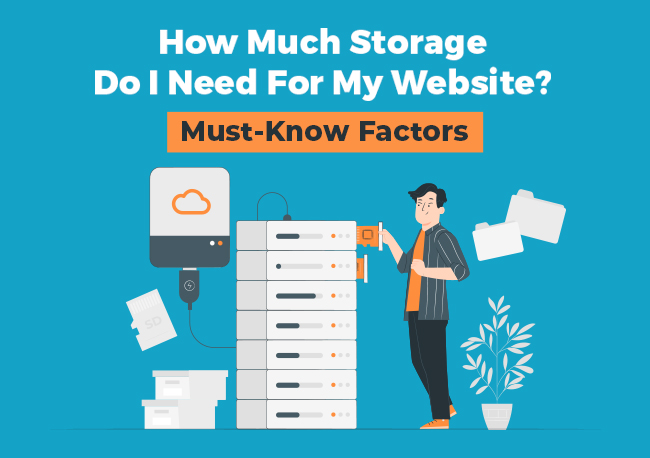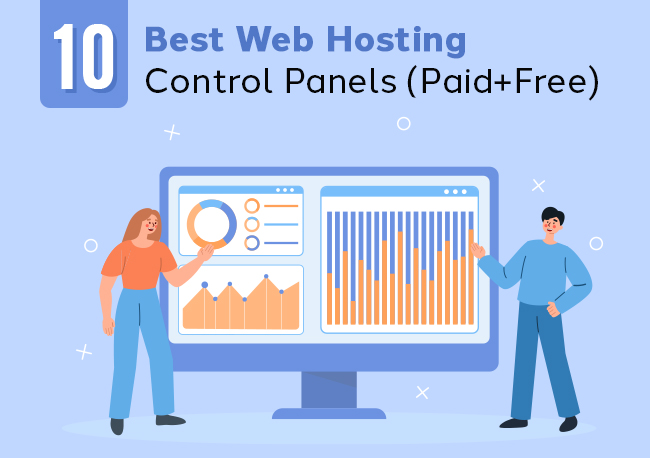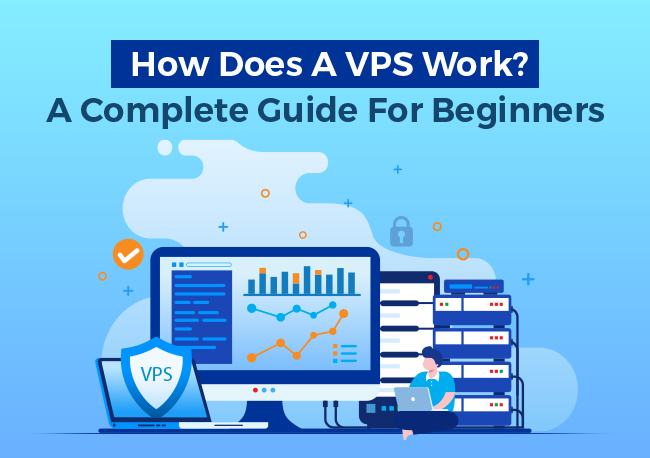Were you ever trying to click a picture but couldn’t save it in the gallery due to insufficient storage? You even tried deleting a few photos, although the spacing issue persists.
Now imagine the exact same scenario for your website’s server. You might be able to delete a few pictures in the gallery but what about your server? You can’t free up some space from there because every uploaded data might be substantial for your business.
Thinking of upgrading your disk space but don’t know how much server space for website hosting is required? Read below to figure out all the aspects of storage capacity for your website.
What Is Website Storage?
Website storage, also referred to as disk or web space, is an overall storage capacity allocated (20 or 60 GB) by hosting providers to web owners for their websites.
Simply put, a certain amount (30 or 50 GB) of storage space is given by web hosting providers for your website to store the data on the server while ensuring a seamless performance. This disk space is always measured in GigaBytes (GB)
You can store all the data on the server, which includes images, text files, folders, HTML Scripts, user information, videos, and emails. The best part about server-side storage is that it is relatively secure and has the capability to store large amounts of data, unlike the traditional methods of online storage.
Also Read: What Is A Website Name?
Why Is Website Storage Important?
We all know that website storage is essential for storing dynamic content, files, and crucial data. However, did you know that storage is vital for numerous other aspects, such as flawless user experience, swift & reliable website performance, and uninterrupted access?
In fact, you can provide an optimal experience to web users while storing an infinite amount of data. For instance – when your site has inadequate storage capacity, you may not only face issues with storing important data on the server but also it can hamper the user experience as it reduces the loading time of a page/website.
Although, if you have sufficient storage capacity, you can upload infinite data on the servers, plus the page loading time will remain unchanged. This ensures a meaningful & relevant user experience.
Moreover, you can make your site accessible even during unstable internet. All you need to do is enable your site for offline storage. So, even if users are offline or have a poor internet connection, they can easily access the features and content of your site.
Also Read: Top 5 Reasons Business Owners Need Website Backup
Why Do Website Owners Need To Consider Web Storage?
There are numerous aspects to be considered when choosing a hosting provider, especially storage capacity. Determining your storage needs from the beginning is vital to ensure seamless functioning and user experience.
Understanding your storage needs will help you decide which hosting type to opt for, whether it’s shared or VPS hosting plans or a dedicated server for your project’s requirements.
Besides the technical aspects, site owners also need to look over the storage capacity for the costing part. You will burn a hole in your pocket if you take a relatively large storage space. Taking up less space will impact your site’s performance.
Mapping out a structured plan while focusing on your website’s features, functionalities, and needs is paramount before occupying the storage space.
Also Read: Website Development Checklist To Help Create Your First Website
Which Facets To Consider For Determining The Server Space For The Website
- Objective of Website
The first question in line is – what is the purpose of your website? This is one of the primary concerns that need to be addressed for storage needs. As different types of websites need different storage capacities.

For instance – if you have a blogging site, a 5-10 GB storage plan is enough in the initial stage. You can expand the capacity as your site grows. However, if you have an eCommerce site, you will need 25+ GB of space as your site has heavy graphics and content.
Once you determine the purpose of your website, figuring out the storage capacity won’t remain a challenging process.
Also Read: Blog VS Website: The Difference You Need To Know As A Beginner
- Content of Website
After understanding your objective, the amount of content you upload on your website is crucial to perceive your storage needs.

You might be wondering if your site is content-dominant, you might not need a larger storage capacity, but let us tell you that’s not true! The stored files, documents, and other relevant content can impact your site and its speed.
Let’s assume your site has static content that updates over time; you won’t require larger space. However, you will need a larger storage capacity for dynamic content sites than a static content website.
Also Read: Best Content Management System Platform Optimized For SEO
- Traffic On The Website
Traffic does not alone mean users are visiting your site. It also means the volume of users visiting your site and the amount of user-generated content, such as inquiry forms, comments, forum posts, reviews, etc.

All these factors can impact the server or storage capacity leading to the delayed response of your site. To manage the increased traffic on your site, choosing a web hosting plan that goes hand-in-hand with your storage requirements is paramount.
Also Read: A Complete SEO Strategy Guide For New Websites
- Size And Complexity
Understanding the size of a website is crucial for selecting the right storage plan. For instance – if your site is primarily composed of text with minimal graphics & designs, and the structure will remain the same over time, you will require smaller space since text takes up less space and is believed to be economically efficient than other heavy and complex graphic-based websites.
Similarly, the storage space should be greater if your site has multiple pages with heavy images and videos and stores user information.
Furthermore, you also need to consider the complexity of a website. Complexity includes the code and traffic generated on a website. If your site has complex code & built with the strongest programming language, you will need sufficient storage capacity to accommodate the data.
Additional note – The factors mentioned above are purely estimated. They are drafted to give you an overview of what factors should be considered for the storage capacity and may fluctuate based on your storage requirements and as your website expands.
Discussing the storage requirements and objectives with your hosting company is advised. So they can allocate the storage capacity accordingly.
Also Read: Cheapest Way To Start A Website
Storage Requirements For Different Websites
There is a saying called, “One size does not fit all,” and a similar example is website storage capacity. In the same way that each site is different, the storage capacity will also differ.
Here’s a detailed explanation of storage requirements for different websites –
- A 5-10 GB storage plan for personal, static, small, and blogging websites is more than enough.
- For eCommerce, gaming, portfolio, media streaming, social networking, news, and other heavy websites, a hosting plan offering 25 to 100+ GB space is recommended.
This recommendation is based on the fact that these websites have high-resolution creatives and are content-rich, which means they will soon occupy a substantial amount of space.
Note – Regardless of the allotted space, you can always expand the storage space based on your needs.
Also Read: 5 Things Small Business Should Know About Web Hosting
Disk Space Without Limits: Does The Concept Exist?
Many hosting companies market the ‘Unlimited Storage’ term to attract users, but let us clear this illusion for you. Unlimited storage is nothing but a myth. Wait up! There’s more to it.
When the providers market unlimited, they mean the storage space would easily suffice your needs. Of course, there are limitations, but only when you reach a certain extent, which is highly unlikely for a web host to stretch at that level.
Although, unlimited storage is futile. Firstly, it is expensive, and secondly, hitting the storage limit is next to impossible, and you will end up wasting space and money.
Also Read: How To Host A Website In Simple Steps
Tips For Minimizing The Hosting Space For The Website
Previously; we discussed the question – How much website space do I need? Now, we will give you a few tips to reduce the website space.
1. Compress Images
This is the initial villain hindering the growth of your website. Uploading large or high-resolution images delays the response time of a website. Hence shrinking the size of images is a must to avoid weighing down your website. You must reduce the images’ dimensions to fit your platform’s size.

Always remember the width and height of the images should never be larger or smaller than the container. For instance – if the container’s width and height are 750 x 750 pixels, uploading an image with a height and width of 750 x 1000 is irrelevant. On top of that, uploading wrong dimension images can make your site look unattractive.
Compressor.io, Compressjpeg.com, and Jpegmini.com are a few tools that can be used for compressing images.
Also Read: Website Optimization Tips To Increase Website Performance
2. Eliminate Unused Content & Code
Removing unused or outdated content from your website is necessary to ensure smooth and uninterrupted functioning. Deleting unwanted content can also free up some space which can reduce the turnaround time of your website.

Examples of unused content include blog posts, outdated services, product listings, unwanted URLs & web pages, unnecessary images & videos, and more.
Irrelevant code can also be a pain point for a slow-loading website. Under such circumstances, removing unused code can spare space and make your site more powerful. The process of removing code includes irrelevant white space, comments, cache, and deleting unwanted HTML, CSS, and Javascript files.
Also Read: Importance Of Mobile-Friendly Website & How Do You Make It?
3. Disable Unnecessary Analytics Tools
You might be using an array of analytics tools to track user activity, determine traffic, and many such on-site movements. However, it’s time to figure out and shut down those useless tools because the data of these activities are generally stored on the server, which can take up a lot of space on your site.

Disabling unnecessary tools does not mean you will shut off the main tools, such as Google Tag Manager, Google Analytics, Facebook Pixels, and so on. Unnecessary tools simply refer to tools that are no longer used on your site (not now or in the future).
Also Read: Best (Paid+Free) SEO Tools For The Best Performing Website
4. Install Gzip Compression
Gzip compression is software that helps compress the HTTP content and files shared or transferred with visitors over the browser. Upon installing the software, you can free up space and reduce page loading time, bandwidth consumption, and SSL overhead.

Gzip works on deflate algorithm, which means once you install the software, it will reduce the size and quicken the network speed, which will help prompt transferring.
Also Read: Best Practices To Secure Your Website
5. Remove Duplicate Content
Duplicate content refers to multiple URLs on the web, session IDs, comment pagination, images, videos, and content that can be found on your website when you mistakenly upload double images and content or make an incorrect setup on the server or website, which is likely the reason why your site has insufficient space.

Fixing such duplicity should be listed as a top priority on your website. It can clear a lot of space and improve your site’s performance.
To Sum Up
If you ever run out of space, don’t forget to try these methods, and if the issue of insufficient space still persists, don’t overlook it and contact your hosting provider to get additional space for your site.
A lack of storage can strike down your business, and you will have a hard time performing any tasks.



